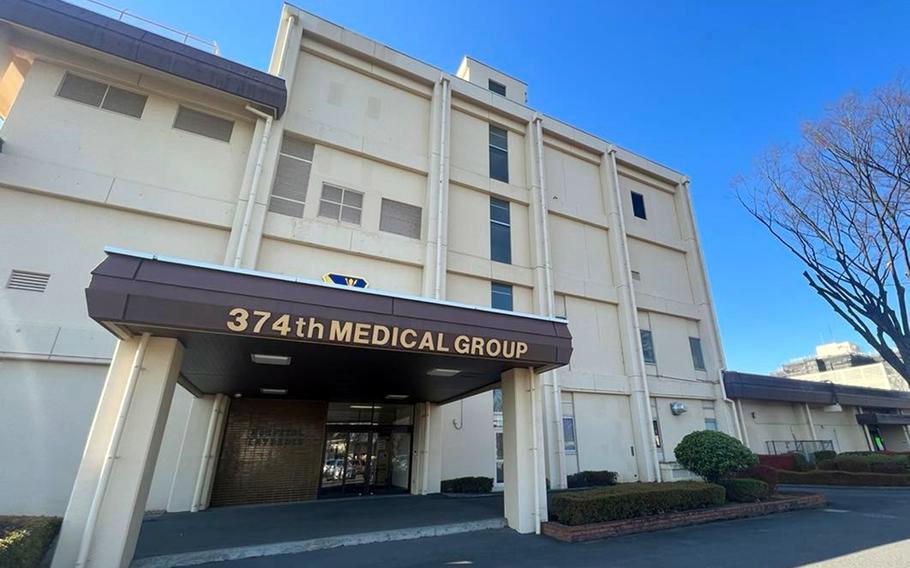
The 374th Medical Group handles patients at Yokota Air Base, the home of U.S. Forces Japan in western Tokyo. (Kelly Agee/Stars and Stripes)
YOKOSUKA NAVAL BASE, Japan – A move by the Defense Health Agency to ease Defense Department employees’ access to health care at military hospitals is encouraging but not quite enough, employee advocates said Monday.
The agency on Friday reversed itself and said DOD civilian employees in the Indo-Pacific region may seek treatment again at base hospitals for chronic health conditions like diabetes or high-blood pressure. But they may only schedule appointments on a space-available basis, according to a DHA memo to Indo-Pacific region director Army Maj. Gen. Joseph Heck.
DHA, under a congressional mandate, on Jan. 1 limited chronic care at base hospitals to only beneficiaries under Tricare Prime, the military’s top-tier medical plan, which includes active-duty service members, their families and eligible retirees. DOD civilian workers, including agency employees, contractors, schoolteachers, analysts and others, were limited to space-available appointments only for sudden onset, or acute ailments.
Space-available appointments for DOD civilians are typically few in number, advertised on short notice and booked quickly. The Friday memo instructs military hospitals to use “standard processes” to find room on their schedules to treat “the greatest number of patients” within their capabilities.
Rescinding the ban on chronic care was an “immediate gift to everyone” who struggled to find routine health care, renew prescriptions and find referrals, Randi Wilson, a health care advocate said Monday. But it didn’t fix everything, she said by Facebook Messenger.
“What it does not fix is our access to emergency services, which has claimed several lives and makes parents afraid for their children,” she said. “It also doesn’t address the fact that our [medical treatment facilities] were already under-resourced and not able to meet active-duty service members' needs.”
Military hospitals exist to provide health care for Tricare beneficiaries and “maintain medical readiness of the force,” according to the DHA memo. But it also said DOD civilian employees and contractors are “critical to our mission success.”
At least one U.S. base in Japan, Camp Zama, on Monday began making space-available appointments for DOD civilians’ “acute and non-acute” medical needs, according to a post on the official Facebook page for the Army Medical Department in Japan. Camp Zama, southwest of Tokyo, is the headquarters of U.S. Army Japan.
Naval Hospital Yokosuka was studying the memo before making changes, according to hospital spokesman Gabriel Archer, who said he could speak only to the policy itself.
“It’s in the decision and planning stages,” he said by phone Monday. “Our priorities are still active duty and their family members.”
Japan Civilian Medical Advocacy, a Facebook group that pressured DHA to reverse the restrictions, spread word of the change over the weekend. Group members expressed cautious optimism.
“Yes, we celebrate a victory, but there is clearly more to be done,” said Em Powers Hunter, a group member, in a comment posted Sunday on the group’s page.
Wilson, a DOD analyst at Yokota who created the online forum, said the change “is a win,” but she worries it may be suddenly reversed.
The current situation mirrors another in 2017, when Naval Hospital Yokosuka and other military medical facilities in the region limited DOD civilians to same-day, space-available appointments.
The change is a “move in the right direction,” Amber Malone, a DOD schoolteacher at Yokosuka who established the civilian medical forum there, said Monday by Facebook Messenger.
But, she said, the group will continue to push for more personnel and funding for military medical treatment facilities and better access to emergency care for “all members of the community.”
The DHA response to civilian complaints about health care didn’t come fast enough for some, according to group member Alexandra Cummings, the spouse of a DOD contractor.
“Sadly, many impacted personnel have already made the choice to leave. They're injured, had their chronic conditions destabilized, are finishing the school year and are in the final stages of securing other jobs and moving back,” she said Monday by Facebook Messenger. “We will lose more people, including talented health care providers before things stabilize.”